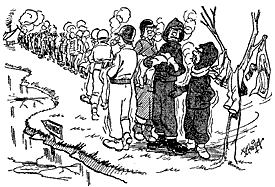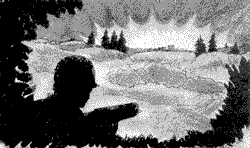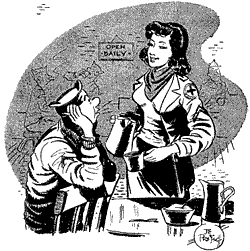|
||||||||
|
||||||||
| Now we could eat, but we couldn't relax. We were still a lost battalion. On the
morning of the sixth day the Germans launched their strongest attack. The planes had
revealed to them the desperateness of our situation. Employing a devastating artillery
barrage, they lunged at us in great force. Somehow, after savage fire fights, we managed
to hold our ground and drive them off. In the meantime the men of the 442nd Regimental Combat Team, together with those of us in the 2nd and 3rd Battalions, had still been trying to break through to our besieged comrades. On the afternoon of the sixth day (October 30th) a 1st Battalion rifleman on outpost saw a figure approaching through the trees. Fearing it might be a Jerry, the rifleman remained in place and strained his eyes to obtain a better view. Then like a crazed person he ran down the hill laughing, crying and yelling at the approaching figure. Pfc. Mutt Sakumoto was at a loss for words as the rifleman ran towards him and hugged him and shouted words of thankfulness. About all he could think of to say was: "Could you use a cigarette?" We were mighty thankful to the brave little men of the 442nd Infantry. Many of us owed our lives to them. Later on in the war we heard that some of these same men had been refused entrance into American Legion clubs in Oregon. Several of us wrote indignant letters; all of us boiled inside at an act so contrary to the ideals we and our Nisei comrades had been fighting for.
Finally, after days of strongly contested advances, days and nights made worse by the drenching rains, mud and approaching snows, the enemy began to withdraw. For a while contact was lost. Nerve-wracking patrol work was intensified to locate the opposing forces. "Probing around for Jerry wasn't any fun," recounted a scout from Love Company, "even if the Brass did have him G-2ed to be miles away. Those Krauts had more mines planted in those woods than you could shake a stick at." No, it wasn't any fun; there was always the anticipation of trouble ahead. Few of us will forget the sight of Anould, Champdray, Rehaupal, Gérardmer and other French towns burning in the distance as the retreating Germans ruthlessly applied the scorched earth policy. At night flames from the burning houses illuminated the sky. Each evening the hazy red inflamed skyline seemed to change direction, indicating that a new village had fallen prey to this Teutonic vandalism. We realized a little more strongly than before the kind of enemy we were facing — one who would stop at nothing. We felt sorry for the villagers. Often times when we had asked these peasants for potatoes, eggs, wine and other delicacies, the answer had invariably been, "Je n'ai pas rien ... Les Boches prenaient tous." Before we had been skeptical — now we began to believe them. We began feeling sorry for ourselves, too, as the towns in front of us went up in flames. The first snows were beginning to fall and we were cold and shivering — weren't we ever going to see the inside of a house again? The enemy's barbarous scorched earth policy nurtured latrine rumor to her greatest heights. Navy scuttlebutt could never compare with her magnificent rationalizations that we were coming to a winter line that could never be broken. Hadn't the opposing forces in the last war perched themselves up on these same Vosges Mountain heights and waved at one another while a veritable truce was in effect? Dame rumor erroneously led us to believe that we would have the war made. Actually, nothing could have been further from the truth. We were approaching the Meurthe River and were soon to again encounter bitter resistance.
For some of us there are happy memories of rest camps. Two days of paradise at Bruyeres or Luxueil-Les-Bains. Some of us recall Bains-Les-Bains and the wonderful hospitality of Candy and Kay. On November 20th Paris opened up as the big deal. But these respites were enjoyed by only a few. The majority of us sweated out our turn to go for weeks and even months.
|
||||||||
Copyright © 1945, 1998 141st Infantry Regiment
Association. |


 Fortunately, as in all wars, there were
occasional breaks from the hellishness of the battlefield. We will never forget the
precious days in the Vosges when our outfits were pulled back out of range of the dreaded
artillery fire for a day or so of rest. For some of us it brings bad memories of Lepanges,
or St. Jean du Marche, for others Deycimont or possibly Docelles. For all of us it recalls
shower tents where our bare feet froze as they touched the icy floor boards and the rest
of our body tried vainly to keep our circulation going as the questionably hot water
trickled down from above. We also recall the feeling of exhilaration as we stepped out of
those ice tents, freed of Italian and French mud, or, for some of us rookies, Omaha beach
accumulations. Then there were clean clothes, never our size, but nonetheless clean.
Sometimes these short reliefs would mean a chance to see a movie. More often than not the
sound track would fail and the film would never run to the end without breaking down three
or four times, but still we appreciated them; it was at least a momentary taste of
civilized life. Occasionally Red Cross girls would come around and hand out doughnuts. We
always welcomed. their presence. They were real live American girls and made our wives and
sweethearts seem just a little bit nearer. Unfortunately these periods of rest were always
shortlived — forty-eight hours if we were lucky. More than once an anticipated two
day rest was reduced to a few hours by an alert to "get 'em on and get ready to move
out."
Fortunately, as in all wars, there were
occasional breaks from the hellishness of the battlefield. We will never forget the
precious days in the Vosges when our outfits were pulled back out of range of the dreaded
artillery fire for a day or so of rest. For some of us it brings bad memories of Lepanges,
or St. Jean du Marche, for others Deycimont or possibly Docelles. For all of us it recalls
shower tents where our bare feet froze as they touched the icy floor boards and the rest
of our body tried vainly to keep our circulation going as the questionably hot water
trickled down from above. We also recall the feeling of exhilaration as we stepped out of
those ice tents, freed of Italian and French mud, or, for some of us rookies, Omaha beach
accumulations. Then there were clean clothes, never our size, but nonetheless clean.
Sometimes these short reliefs would mean a chance to see a movie. More often than not the
sound track would fail and the film would never run to the end without breaking down three
or four times, but still we appreciated them; it was at least a momentary taste of
civilized life. Occasionally Red Cross girls would come around and hand out doughnuts. We
always welcomed. their presence. They were real live American girls and made our wives and
sweethearts seem just a little bit nearer. Unfortunately these periods of rest were always
shortlived — forty-eight hours if we were lucky. More than once an anticipated two
day rest was reduced to a few hours by an alert to "get 'em on and get ready to move
out."